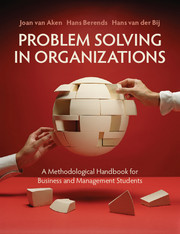Preface
Summary
Preface
This handbook provides the methodology for problem solving in organizations. Its target audience includes not just undergraduate and graduate students in management and in business but also other people regularly involved in business and organizational problem solving, such as junior management consultants or engineers and other professionals working in organizational contexts. This second edition is a thoroughly revised version of the 2007 edition. The revision includes a new chapter on how to use problem solving projects to develop generic theory, further detailed discussions on designs and the design process, and more illustrative cases and cases for instruction.
The ability to solve business and organizational problems in real-life organizational settings can be regarded as the key competence of managers and of professionals working in organizations. A powerful way for students to develop this competence is to engage in problem solving in real organizational settings under academic supervision. Solving paper cases can develop a number of cognitive competences, but not all the competences that are needed to be successful in the fuzzy, ambiguous and politically charged real-life organizational context. This handbook aims to provide a methodological basis for problem solving in organizations.
- Type
- Chapter
- Information
- Problem Solving in OrganizationsA Methodological Handbook for Business and Management Students, pp. xiii - xviPublisher: Cambridge University PressPrint publication year: 2012



